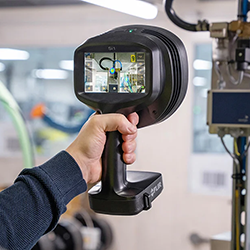Perks of Adopting an Agile Manufacturing Plan
Agile manufacturing embraces state-of-the-art technology and tools to help engineers, designers, and marketers increase production capabilities and meet customers’ demand in a quick manner.
Customers are the king, and their demand is the ladder which allows you to reach them. The approach of fulfilling their demand should be prompt, precise and productive. Agile manufacturing plan encourages an increased level of productivity in a short period of time. It delivers value to the customer which strengthens the partnerships with suppliers and other vendors. Moreover, in this competitive era, every manufacturing company strives to produce world-class products in a good quantity with a shoestring budget. Manufacturers create a plan and execute it with these things in mind.

Most of the SMBs have been using agile plans for many years. Now the question is, “How have they been using it?", because this is an advanced phenomenon. In simple words, agility is the promptness of accomplishing the task in a manner where less time is consumed. For example, if a customer abruptly asks for a product on an urgent basis, and you as a business owner have the product in your warehouse, this will lead to a fulfilled order and a happy customer. But if you don’t maintain the stock appropriately, then the customer will look for another company and this will affect your rapport and sales. In the preceding example, maybe you are working on an agile plan, but you don’t realize it.
Coming back to agile manufacturing, it is an initiative adopted by modern businesses to respond quickly to customer’s needs while controlling costs and maintaining quality standards. It is suitable for those organizations which go through unpredictable business conditions time and again.
Well, automation and cloud technology have changed businesses in profound ways. With smart, connected factories, manufacturers can predict maintenance requirements of machines, correlate quality issues and improve quality while reducing downtime.
Agile manufacturing adds more to these advanced technologies and makes the overall processes more streamlined and smoother. When operations are done automatically on time, production capabilities are improved, the cost is reduced, and customers are happy, nothing can stop you from succeeding in the long run.
Why do you need to adopt agile manufacturing?
Agile manufacturing adopts the set of technologies which intend to improve internal and external communication. It is focused on connecting the organizational staff while managing the data and resources. There are many reasons to adopt agile manufacturing, and the two critical reasons are –
- Technology
- Market volatility
Technology, products and its user experience are interconnected. Technology is the driving force behind the growing competition. With industrial automation, IoT and other evolving technology, agility is paramount for achieving a competitive edge.
Because of market volatility, agile manufacturing is one of the practices which businesses should adopt, keeping in mind the growing competition and customer expectations. To stay on the competitive edge, it has become a must to fulfill the customers’ demand in less time, while not compromising with the product quality.
Agile manufacturing aims to split projects into smaller modules, to establish collaboration in the organization and streamline processes. To adopt agile manufacturing strategy, organizations should redesign their product manufacturing processes to come across new principles and plans. For example, if employees in your company sit in separate silos and don’t interact with each other, then this needs to be changed.
To achieve agile workflow, databases should be shared amongst the designers, marketers, production teams and persons who are responsible for the respective tasks. Separate teams ought to collaborate constructively to address the challenges and reflect their contributions.
Here are some ways how agile manufacturing can help your business grow –
- Agile manufacturing paradigm nurtures an integrated supply chain, greater data visibility, and actionable insights.
- Just-in-time business model is quite a common terminology in agile manufacturing as it focuses on reducing wastage and warehousing cost and frees up space for production.
- Today, businesses run on multiple software. ERP is one such software to act as a backbone for organizations as they manage all the functions independently. Integrated ERP solutions facilitate agility, productivity, and growth by unifying processes and workflows, improving communication across the departments.
- From warehouse to sales and procurement to the shop floor, you can view a combined, consolidated and real-time data to enable prompt and wise business decisions.
- Agile manufacturing plan continue to help business flourish and expand.
With rich capabilities in the manufacturing domain, a complete and reliable enterprise resource planning solution has the strength to transform your business drastically and give you a leading edge.
Kabir Shenvi, Business Development Manager OptiProERP
I am a global leader specializing in Manufacturing ERP Software in the areas of new product development, product marketing and product line strategy deployment. I have worked for global MNCs and have expertise in Cloud ERP, Manufacturing ERP and Supply Chain Management solutions.
Comments (0)
This post does not have any comments. Be the first to leave a comment below.
Featured Product

